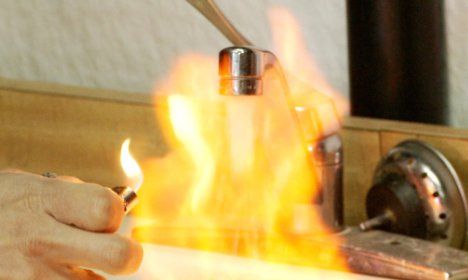
Still from the movie "Gasland."
A team of scientists at Duke University published a paper yesterday which should make Gasland director Josh Fox very happy: It provides peer-reviewed, prestigiously-published scientific evidence that hydraulic fracturing may contaminate drinking water with methane, making it flammable.
The most compelling image in Fosh's documentary is of a flaming facuet, but until now, there has been no scientific study suggesting that fracking might have something to do with it.
The Duke study, which was published in the Proceedings of the National Academy of Sciences yesterday, contains the first evidence that fracking and flaming faucets might be connected, its authors wrote in a whitepaper released along with the study yesterday.
[The study] provides to our knowledge the first systematic evidence of methane contamination of private drinking‐water in areas where shale gas extraction is occurring. The research was performed at sites above the Marcellus and Utica formations in Pennsylvania and New York. Based on groundwater analyses of 60 private water wells in the region, methane concentrations were found to be 17‐times higher on average in areas with active drilling and extraction than in non‐active areas, with some drinking‐water wells having concentrations of methane well above the “immediate action” hazard level.
Although the findings about methane contamination are disturbing, some of the study's findings are actually good news for the gas indudstry. ProPublica's hydraulic fracking reporter Abrahm Lustgarten reported yesterday that the study did not find any trace of fracking chemicals or radiation in drinking water, a leading concern amongst anti-fracking activists and the subject of a recent New York Times investigation:
The researchers did not find evidence that the chemicals used in hydraulic fracturing had contaminated any of the wells they tested, allaying for the time being some of the greatest fears among environmentalists and drilling opponents ...
The water was also analyzed for signs that dangerous fluids from inside the gas wells might have escaped into water supplies. The group tested for salts, radium and other chemicals that, if detected, would have signaled that the produced water or natural fluids in the well’s target zone were making it to the aquifers. But those types of fluids were not found. The group did not test for fracking chemicals or hydrocarbons like benzene, relying instead on the saline or radioactive compounds like radium as indicators.
In an interview, [study author Robert] Jackson said that gas was more likely to migrate underground than liquid chemicals. Based on his findings, he doesn’t believe the toxic chemicals pumped into the ground during fracturing are likely to end up in water supplies the same way the methane did. “I’m not ready to use the word impossible,” he said, “but unlikely.”
Read the entire Duke study below:
Methane contamination of drinking water accompanying gas-well drilling and hydraulic fracturing












